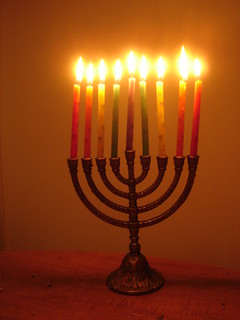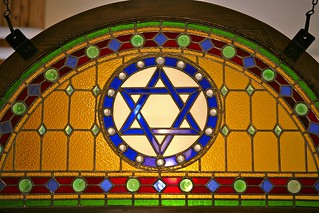 This installment of the Diverse Expressions of Grief series covers Jewish mourning prayers to commemorate the Jewish holiday Hanukkah, which in 2012 spans from the evening of December 8th to the evening of December 16th. Also called the Festival of Lights, Hanukkah is an eight-day holiday that starts on the 25th day of the Hebrew calendar month Kislev. Kislev falls any time from late November to late December in the Gregorian calendar, which means that the time frame for the holiday is different every year.
This installment of the Diverse Expressions of Grief series covers Jewish mourning prayers to commemorate the Jewish holiday Hanukkah, which in 2012 spans from the evening of December 8th to the evening of December 16th. Also called the Festival of Lights, Hanukkah is an eight-day holiday that starts on the 25th day of the Hebrew calendar month Kislev. Kislev falls any time from late November to late December in the Gregorian calendar, which means that the time frame for the holiday is different every year.
Hanukkah commemorates the rededication of the Second Temple in Jerusalem in the 2nd century BCE. The lighting of the eight candles of the menorah symbolizes the miracle of one day’s worth of oil burning for eight days during the rededication. This allowed time for more candle oil to be made without the candles ever burning out.
This installment will first provide a background on Judaism and then describe two Jewish mourning prayer services, the Mourner’s Kaddish and yizkor. It concludes with a reflection on how these Jewish mourning prayers connect to the universal experience of grief.
Background on Judaism
Judaism encompasses the religion, customs, and identity of Jewish people. It is observed in vastly different ways around the world. Some may follow the customs of Jewish people but not believe in Judaism as a religion. Conversely, others observe Judaism as a religion but do not participate in some or any of the Jewish customs. Yet others may identify as Jewish through family relations or conversion, but do not practice some or any of Jewish customs or Judaism as a religion.
This complexity with defining Judaism is due to its long 3,000-plus year history and its diffusion throughout the world. Currently, nearly all Jewish people reside in Israel, the United States, or Canada, with most of the remainder not residing in those countries located in Europe. In 2010, the world Jewish population was estimated to be 13.4 million people, or about 0.2% of the world population.
Judaism in North America is generally divided into three main denominations, Orthodox Judaism, Conservative Judaism, and Reform Judaism. Reform Judaism is currently the largest denomination of American Jews with an estimated 700,000 members. Reform Judaism defines Judaism as a religion rather than as a race or culture. It generally rejects Jewish law but does emphasize personal connection to the Jewish tradition.
Jewish religion and customs are captured in written and oral tradition. The written tradition consists of the Tanakh, or the Hebrew Bible that closely corresponds to Christianity’s Old Testament. Within the Tanakh is the Torah, also known as the Five Books of Moses. The oral tradition consists of the Mishnah, the Midrash, and the Talmud.

Jewish Mourning Prayers
Mourner’s Kaddish
The Kaddish is an Aramaic prayer that is approximately 2,000 years old. It is composed in Aramaic as opposed to the more traditional Hebrew because Aramaic was the common language of the Jewish community at the time of its writing.
Slightly different variations of the Kaddish are used for a variety of prayer ceremonies, but it is most often used for mourning. Because of this distinction, when someone mentions the Kaddish, the Mourner’s Kaddish is typically the version of the prayer being implied.
When a parent, child, sibling, spouse, or relative dies, according to Jewish custom the person’s mourners are to recite the Mourner’s Kaddish on a daily or weekly basis ranging from one month to eleven months. The frequency and length of time the Kaddish is performed in the first year depends on the type of loss and how often the mourners can feasibly perform the prayer ritual. After the first year, the Kaddish is performed every Yahrtzeit, or anniversary of the loved one’s death. The mourner or mourners are to recite the Mourner’s Kaddish at a synagogue with a minyan, or a quorum of ten adults.
If the Kaddish is not about death and mourning, then why is it commonly used as a mourning prayer? The Kaddish simply praises God and expresses yearning for God’s presence on Earth; this basic salutation is appropriate for many of life’s events, including death and grief. In the context of mourning a loved one, the custom of reciting the Kaddish repeatedly is intended to comfort the living, cleanse the soul of the deceased, and communicate to God that those grieving still believe in God despite the pain of their loss.
Here is a translation of the Mourner’s Kaddish:
“May the great Name of God be exalted and sanctified, throughout the world, which he has created according to his will. May his Kingship be established in your lifetime and in your days, and in the lifetime of the entire household of Israel, swiftly and in the near future; and say, Amen.
May his great name be blessed, forever and ever.
Blessed, praised, glorified, exalted, extolled, honored elevated and lauded be the Name of the holy one, Blessed is he- above and beyond any blessings and hymns, Praises and consolations which are uttered in the world; and say Amen. May there be abundant peace from Heaven, and life, upon us and upon all Israel; and say, Amen.”
Here is a recording of the Mourner’s Kaddish being spoken:
http://www.youtube.com/watch?v=k95UQobi83I
Here is the Mourner’s Kaddish before translation:
http://www.jewfaq.org/kaddishref.htm
Yizkor
Yizkor, which generally translates as “to remember,” is a remembrance prayer service performed at services for the Jewish holidays of Yom Kippur, Passover, Shavuot, and Sukkot. The yizkor prayer service consists of a series of prayers spoken out loud and prayers that participants read silently to themselves. Many congregations choose to follow these prayers with the Mourner’s Kaddish.
The yizkor prayers essentially ask God to remember the deceased because the person reciting the yizkor prayers pledges to give charity on behalf of the deceased. The reward for the charity performed is the chance for the soul of the deceased to join the righteous souls of people who have passed long ago. This charity performed by the living can be done through monetary donations to a charitable cause or through volunteering for a charitable cause.
Reflections on Jewish Mourning Prayers
Both the Mourner’s Kaddish and the yizkor prayer services parallel things many grieving people do as they mourn their loved ones. Many grievers find beauty in the world and their lives again even after suffering the pain of losing a loved one. Many grievers also dedicate acts of charity and kindness in the memory of their lost loved one. Some grievers do these things through their faith, as those who participate in the Mourner’s Kaddish and yizkor prayer services do. Regardless of the path taken, these acts of meaning-making are what help many grievers find the strength to keep moving forward in their lives.
About the Author:
Hilary Dockray came to know The Christi Center through her full-time field internship as a graduate student from The University of Texas at Austin’s School of Social Work. She is expecting her MSSW in December of 2012 and hopes to work in nonprofit administration and management. She is an advocate for the understanding of grief and the support of those who grieve in both her personal and professional lives. Her favorite hobby is writing, so she is delighted to be a guest blogger for The Christi Center.
Just a few of the links that I used for my research where you can also learn more about Judaism, the Mourner’s Kaddish, and yizkor:
Judaism
http://en.wikipedia.org/wiki/Judaism
http://www.jewfaq.org/judaism.htm
http://www.jewfaq.org/whoisjew.htm
Mourner’s Kaddish
http://www.jewfaq.org/kaddishref.htm
http://www.mykaddish.com/mourners-kaddish.html
http://en.wikipedia.org/wiki/Kaddish
Yizkor
http://www.jewishvirtuallibrary.org/jsource/Judaism/yizkor.html
http://www.myjewishlearning.com/life/Life_Events/Death_and_Mourning/Burial_and_Mourning/Yizkor.shtml

